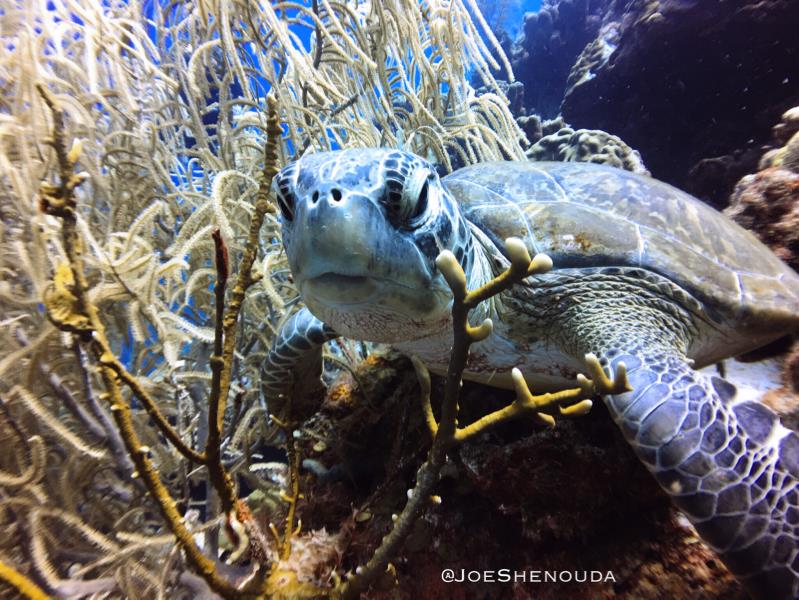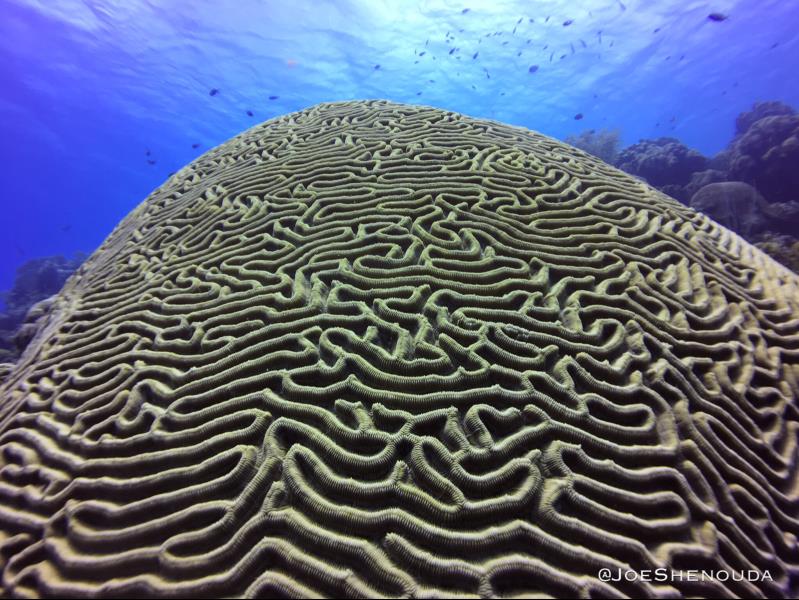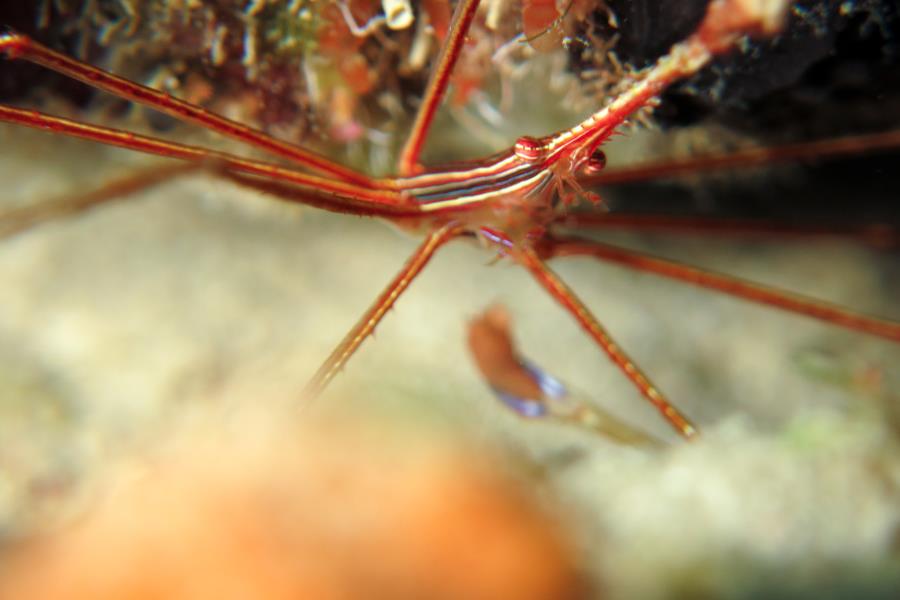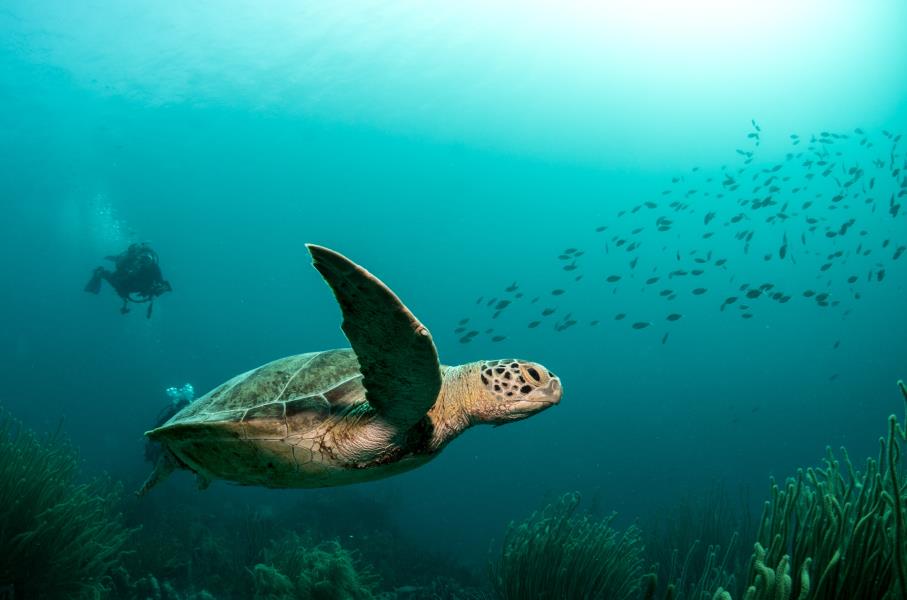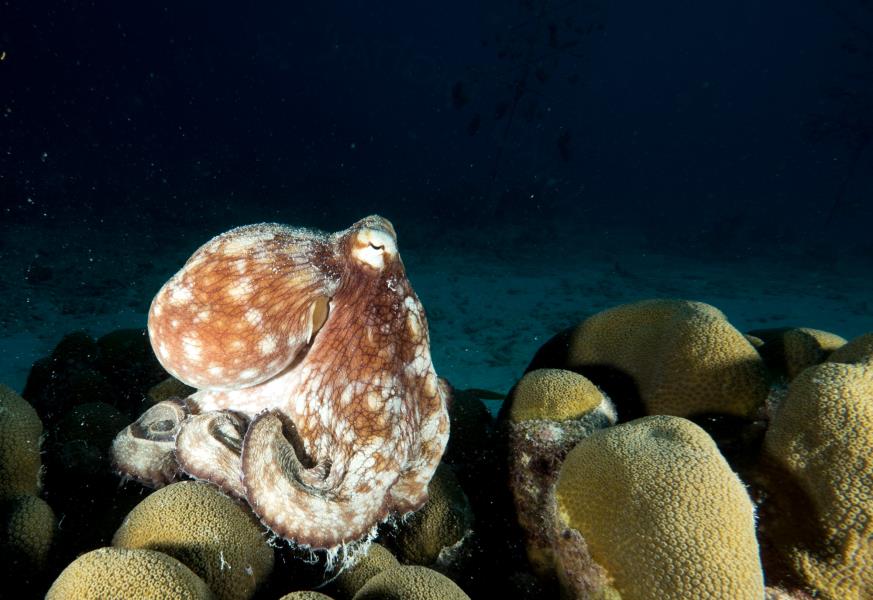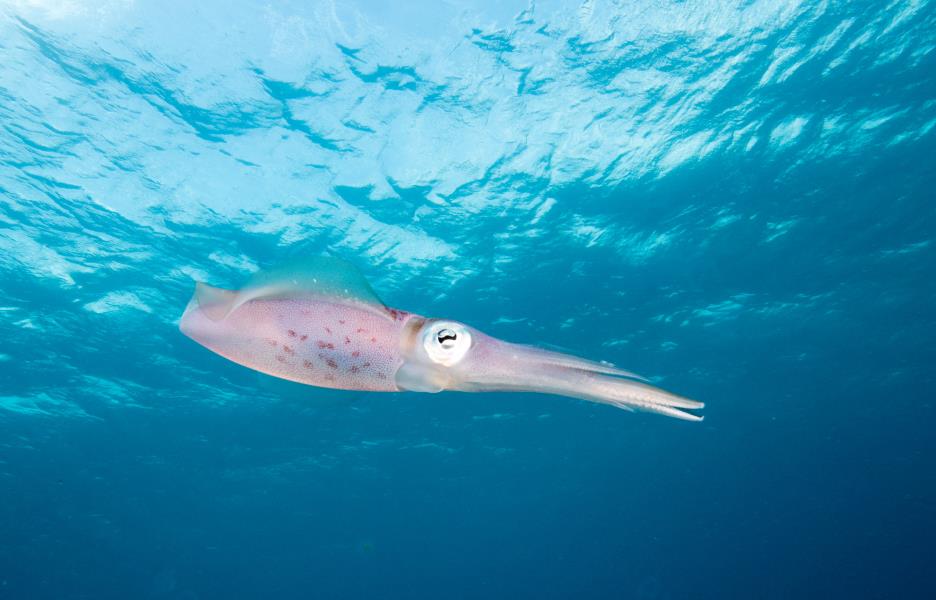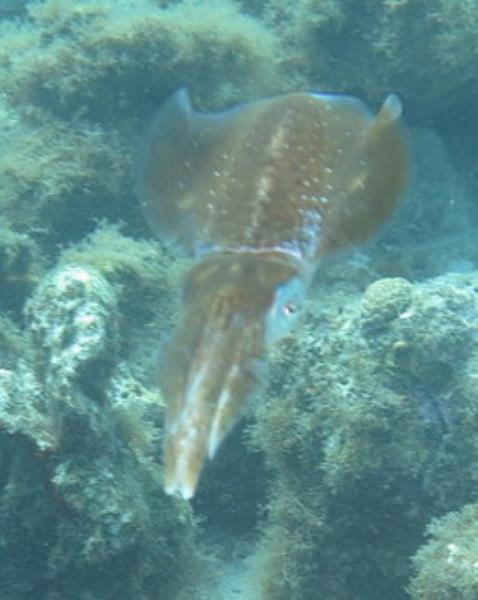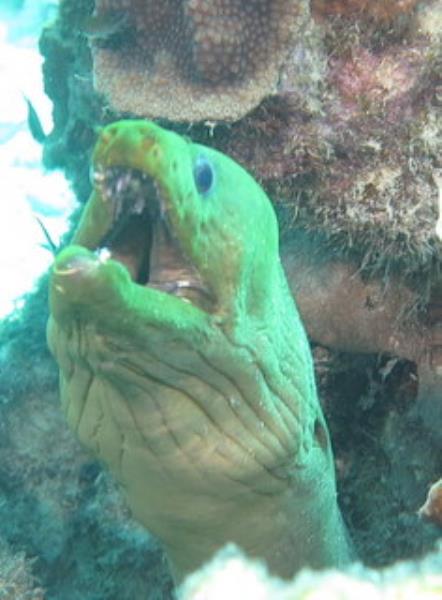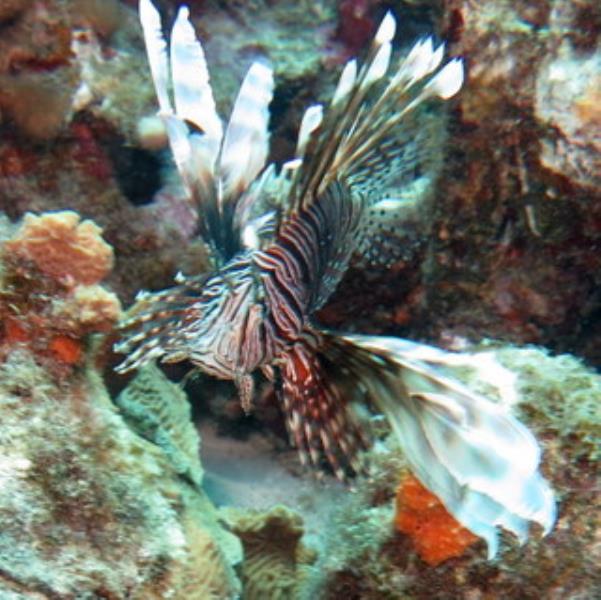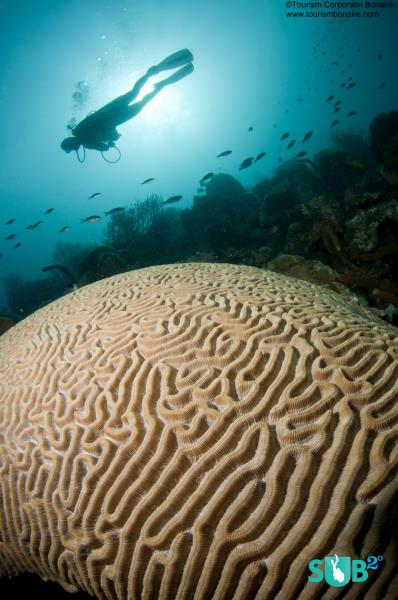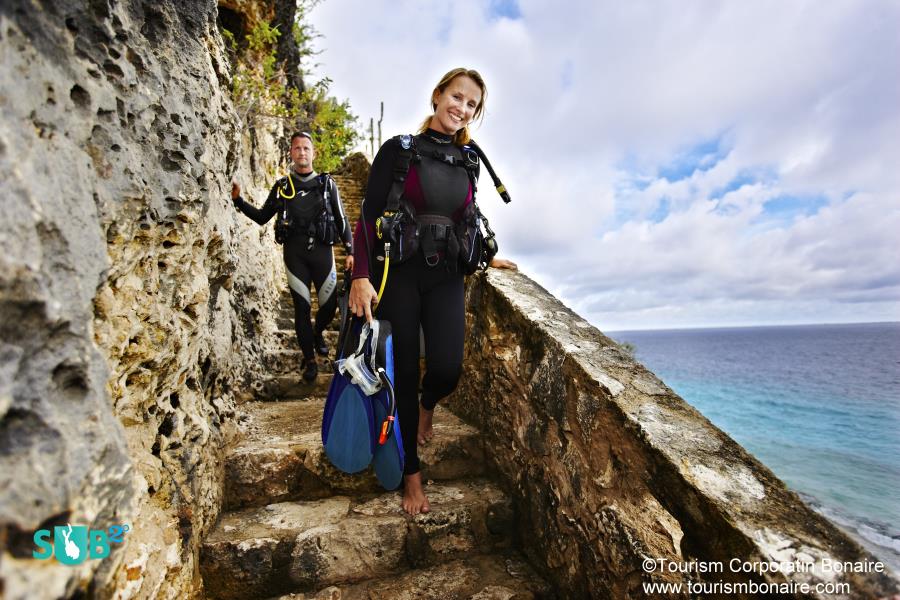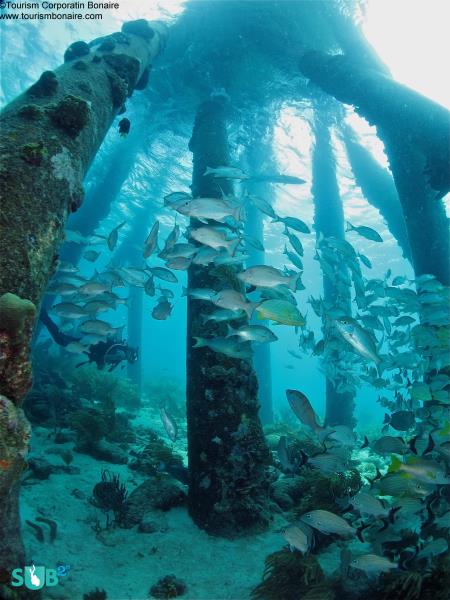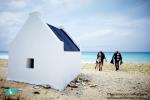 Advice on Scuba Diving in Bonaire, Caribbean Netherlands
Advice on Scuba Diving in Bonaire, Caribbean Netherlands
Part 1: Overview of Scuba Diving in Bonaire, (Caribbean Netherlands)
Bonaire is one of the Dutch islands that fall under the jurisdiction of the Netherlands in the Caribbean. The smaller uninhibited island of Klein Bonaire, off the west coast, is included in the special municipality. It is often referred to as part of the ABC islands (with Aruba and Curaçao) in the Leeward Antilles. The island is located at the very southernmost point of the island chain of the Lesser Antilles, only 50 miles north of Venezuela. Dutch, Papiamento, English, and Spanish are widely spoken.
Because of the islands position so far south, it is out of the Caribbean hurricane belt. Bonaire enjoys a year-round temperate climate, with 12 hours of daylight per day. Average yearly air temperature is 82F, with average water temperature sitting at 80F - a long 3mm is adequate thermal protection. It does rain, but the showers never last too long.
This Caribbean island is exceptionally well managed as a vacation destination - from beautiful diving and cultural land activities, to delicious dining and comfortable accommodation. World class reefs, professional and safe dive centers, and a year-round holiday attitude make it a fabulous dive holiday spot. Good quality service and hospitality really make this island stand out in the Caribbean.
There are plenty of land-based activities to complement the amazing diving. The snorkeling is very accessible from shore with 17 official snorkelling spots; water taxis will take you to visit Klein Bonaire's reefs. Kayaking, kite surfing, biking, horse riding, hiking, bird watching, and rock climbing are some of the most popular pastimes. Guided sightseeing tours are available and the island's culture can be explored through the museums and galleries. The island has many restaurants, bars, bakeries, and shops; there is even a casino!
The island has a strict flying after diving policy. A 24-hour surface interval prior to flying is recommended. The required minimum of 12 hours surface interval is enforced. At no time will you be allowed to dive on the same calendar day that you fly. In case of a diving accident or emergency, Bonaire has a recompression chamber on the island. The chamber is located behind the Centro Medical Central, and people in need of treatment must go to the hospital to be granted access to the chamber.
Part 2: Dive Sites, Marine Life & Environment in Bonaire, (Caribbean Netherlands)
If relaxing boat diving is your choice, then the dive resorts happily provide daily trips - normally a two tank in the morning and a single in the afternoon. The centers are good at varying the sites each week. The delight of experiencing well-managed shore diving is not to be missed. Get your hands on one of the detailed dive maps, hire a custom dive jeep, and set your sights on one of the many awe-inspiring dive sites along the west coast.
On the roadside, bright yellow painted rocks clearly mark each site, making it easy to park, check conditions, and start dive planning. Divers are advised to use sturdy wetsuit booties for comfortable shore entries and exits over the shingle and rocky beaches.
Sea conditions in Bonaire are ideal for all levels. Currents are normally weak, although some sites (such as in the very south) do experience stronger ones that can split at depth. Divers are recommended to start their dive into the current, turn around halfway, and then gently float back to the exit point. There are over 60 officially listed dive sites on the leeward coast of Bonaire, and 20 sites on Klein Bonaire - all with amazing corals, sponges and marine life. You never know what you are going to find!
Visibility averages 80-100ft, and surface conditions are generally calm. The fringing reef starts just 30ft (10m) from shore - the reason why this is the "Shore Diving Capital of the Caribbean"! Divers can choose their depth level as they dive along the sloping reef system.
Bonaire's fringing reef is classified as a National Marine Park, from the high water mark down to a depth of 200 feet/60m. Every diver (who has not dived on the island within the last calendar year) must attend a diver orientation. You are required to obtain a Marine Park tag, which is necessary to legally dive in Bonaire's waters. The cost of the tag is US$25 for divers, or US$10 for others, and proceeds go towards the protection and preservation of the Bonaire National Marine Park.
To go with the orientation, a mandatory check-out shore dive, for correct equipment and weighting, is required before diving without supervision. Your dive operator will organize this, normally on the morning after your arrival, as well as any rental equipment or last-minute gear purchases.
Top dive sites to visit are Karpata, La Dania's Leap, 1000 steps, La Machaca, the Hilma Hooker Wreck, Vista Blue, and Jerry's Reef. Marine life is abundant and diverse - over 460 species of fish have been recorded; turtles, eagle rays, eels, frogfish, and seahorses are all fairly common to find. Divers will see up to 60 types of coral, ranging from the hard corals of the shallows, to gorgonians and black corals the deeper you go. The sponge growth is plentiful, large, and very healthy. Enjoy!
Part 3: Dive Shops, Airports & Logistics of Diving in Bonaire, (Caribbean Netherlands)
There are 20 dive operators on Bonaire, representing all the major recreational diving agencies, such as PADI and SSI. Certification courses and experience programs are offered by every dive center. Nitrox is widely available. Professional level courses are run on the island from divemaster to instructor ratings. Guided diving trips from boat or shore run daily from each center. Many of the centers are multi-lingual. Disabled divers will find the facilities at Divi Dive Bonaire and Captain Don's Habitat to be very accessible as HSA approved centers.
Technical diving is very popular around Bonaire, as the fringing reef reaches depths of 60m (200ft). The full range of courses from Advanced Nitrox, through to Advanced Trimix, and rebreather training is offered. Instructor courses are available too. Full technical equipment hire and the associated gas mixes can be pre-arranged. Captain Don's Habitat, Caribbean Gas Training, Divi Dive Bonaire, Buddy Dive, Rec Tek Scuba, Toucan Diving, and Dive Friends Bonaire are all technical diving centers.
Buddy Beach & Dive Resort is a PADI 5 Star IDC Center, with a great team of professional and welcoming staff. The spacious dive center has everything you could want on site - custom dive dock, digital photo center, "Drive Thru" air/nitrox fill station, full rental and retail center, and an amazing house reef. Their fleet of custom dive boats offer comfort to all levels of diver. PADI courses are offered from beginner up to instructor with their resident PADI Course Director. Buddy Dive is also a Universal Referral Center - offering certification dives from NAUI and SSI, as well as other agencies. This dive center is home to the Coral Restoration Foundation Project - two training nurseries can be found on the house reef, with the major nursery for staghorn and elkhorn located on Klein Bonaire. I loved the passionate and energetic atmosphere at Buddy!
Divi Dive Bonaire at Divi Flamingo Beach Resort & Casino is a PADI 5 Star Resort. They have five custom dive boats, with fresh water rinse facilities, camera tables, and wide swim platforms on board. A fully equipped retail shop with equipment rental and gear storage lockers is back at base. Divi offers 24/7 diving with tank collection at the dock or the parking lot tank station. The Calabas house reef is just a few steps down the dive dock, and shore diving on the house reef is popular day or night. Night diving boat trips can be requested. Recreational and technical certification courses are available. I really enjoyed diving with this friendly and knowledgeable team!
The Flamingo International Airport (BON) is Bonaire's local and international gateway. Insel Air, Dutch Antilles Express, and Tiara Air provide inter-island flights via Aruba or Curaçao - as there are no direct flights from South America. From North America and Europe, direct flights depart from Amsterdam, Newark, Houston, Atlanta, and Miami. Cruise ships regularly visit Bonaire too.
Many resorts offer the service of a 'Drive & Dive' package, which includes a hire vehicle. Do not leave valuables in the vehicle when diving – use standard security precautions and common sense. Scooters, motorbikes, quads, and bicycles are also available to rent. Driving is on the right hand side of the road and the speed limit is 40km per hour.
---- Book Your Diving ----
Fill in the Form Below.
Our hand picked regional partners will deliver no obligation quotes.
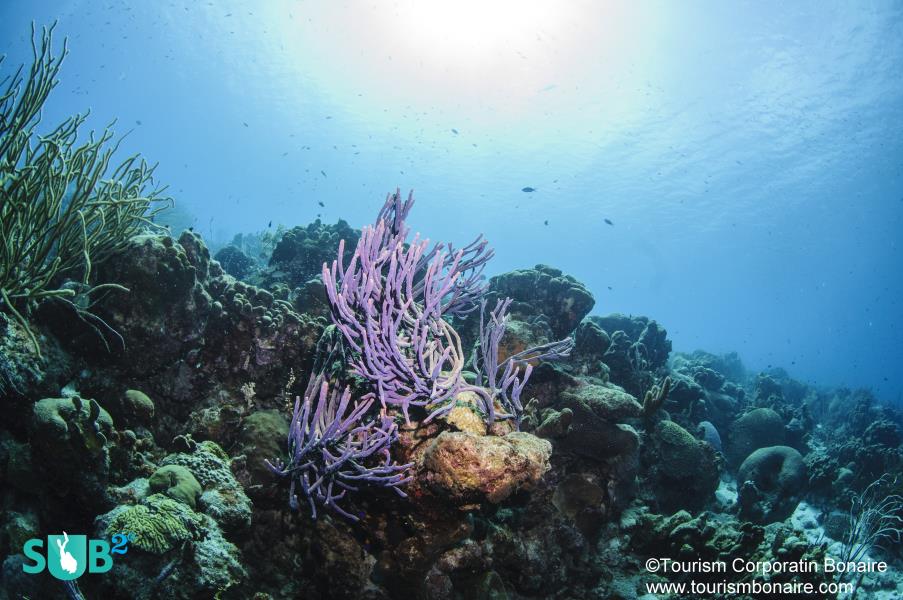
Tweets by @DiveAdvisorApp
Top Dive Shops
Top Dive Sites
Reviews
Certifications Offered
-
Seal Team
Buddy Dive Resort , Bonaire -
Bubblemaker
Buddy Dive Resort , Bonaire -
Discover Scuba Diving
Buddy Dive Resort , Bonaire
Dive Types & Activities
- Wreck Dive
- Training
- Reef Dive
- Search & Recovery
- Underwater Photo & Video
- Underwater Research
- Boat Dive





